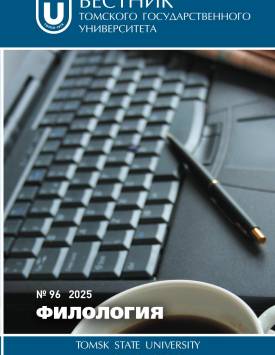The role of Hoffmann's poetics in the creation of the mythologem "genius" in Thomas Mann's novel Doctor Faustus
The article examines the question of the reception of Hoffmann's traditions in Mann's novel Doctor Faustus. The relevance of this study is due to the fact that the question of the influence of Hoffmann's work on Mann in connection with the image of a genius in literary studies has practically not been raised. On the basis of comparative typological, neo-mythological, intertextual and descriptive methods, the features of Hoffmann's poetics in the story under study are systematized, considered systematically as a unity of problematics, images and stylistic techniques characteristic of Hoffmann's work ("Hoffmann complex"), and their transformation in Mann's novel is analyzed. It is argued that the "Hoffmann complex" in Doctor Faustus manifests itself in the form of the mythologem "genius", consisting of such elements as: understanding the problem of the nature of the genius (antagonism of the genius and the philistine, ambivalence of good and evil principles in the genius), the problem of the relationship between the genius and femininity (the motif of choosing between the "true" and "false" lover, the problem of romantic love as a source of inspiration), the motif of seducing the creator by the devil, the problem of returning art to the bosom of Christianity, the motif of creative emancipation through madness (the motif of laughter), as well as understanding the problem of art synthesis. The question of the influence of Hoffmann's work on Mann in connection with the image of a genius has not yet been raised in literary studies, which has increased the relevance of this work. It is concluded that Mann interprets the mythologem "genius" as a way of embodying the Zeitgeist category in German culture. The writer considers the series "Faust - Kreisler - Leverkuhn" as evolutionary, and the image of Adrian Leverkuhn as final. To create the image of the latter, Mann resorts to the achievements of Hoffmann's poetics, since the German Romanticist largely anticipated the techniques of postmodern literature (parody, destructive irony, emphasis on the fantastic and the terrible, the motif of the dichotomy of good and evil in man). The results of the study show the presence of a bright layer of the "Hoffmann complex" in Mann's novel Doctor Faustus, which allows us to consider it as a significant stage in the formation of the Hoffmann text ("supertext") of German literature. The authors declare no conflicts of interests.
Keywords
E.T.A. Hoffmann, Thomas Mann, mythologem "genius", "Hoffmann complex", Zeitgeist, problem of genius' nature, destructive ironyAuthors
| Name | Organization | |
| Koroleva Vera V. | Vladimir State University; Privolzhsky Research Medical University | queenvera@yandex.ru |
| Pritomskaya Alina R. | Vladimir State University | gera.greenhill@gmail.com |
References
 Doctor Faustus | Vestnik Tomskogo gosudarstvennogo universiteta. Filologiya – Tomsk State University Journal of Philology. 2025. № 96. DOI: 10.17223/19986645/96/10" width="275" height="355"/>
Doctor Faustus | Vestnik Tomskogo gosudarstvennogo universiteta. Filologiya – Tomsk State University Journal of Philology. 2025. № 96. DOI: 10.17223/19986645/96/10" width="275" height="355"/>
The role of Hoffmann's poetics in the creation of the mythologem "genius" in Thomas Mann's novel Doctor Faustus | Vestnik Tomskogo gosudarstvennogo universiteta. Filologiya – Tomsk State University Journal of Philology. 2025. № 96. DOI: 10.17223/19986645/96/10
